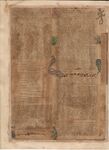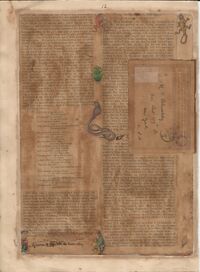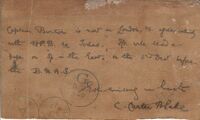Difference between revisions of "HPB-SB-7-12"
m |
|||
| Line 8: | Line 8: | ||
{{Style P-HPB SB. Title continued |Is Man's Immortality Conditional?|7-11}} | {{Style P-HPB SB. Title continued |Is Man's Immortality Conditional?|7-11}} | ||
| − | ... | + | {{Style P-No indent|save my own unhappiness. My daughter was practising at the piano, and though I was at first too occupied by my own reflections to notice what she was doing, yet the noise at last began to jar on my nerves, and I asked her to give up practising, and try to let us have a ''seance ''quite to ourselves. With evident and unmistakable reluctance she drew a chair towards the table by my side; and glad to have secured her compliance on any terms, I rose hastily, and placed before her a piece of paper and a pencil, taken from a side table in the same room. To the best of my recollection, not one word passed with reference to the reflections that had been occupying my mind for the previous hour or two. Almost instantly that she took up the pencil, a sofa was sketched out on the paper before her. She has never either learnt drawing or shown any desire to draw. “What can that mean?” I thought. “Are we to look on the sofa for anything?” was my inquiry. There were three loud raps, which signified to me a reply in the affirmative. My daughter rose and went towards the sofa. She moved it from the wall, she took up the cushions and antimacassars, and examined carefully the seat and the ground below, but all was as usual, and we both thought “Peter” was playing us some trick. Miss Showers said as much, as she returned to her seat, the raps accompanying her all the time, and becoming louder and more imperative as she sat down. Upon this I rose, and walked to the sofa, which was hardly four feet from where I was sitting. I looked at it carefully, and even raised it to examine the seat underneath. In vain—nothing was to be seen there, and I was giving up the search when it occurred to me, why or wherefore I cannot say, to put my hand down in the narrow space between the back and the seat. To my astonishment, my fingers touched some paper, and I drew out a crumpled sheet of foolscap, on which were the following lines:—}} |
| + | |||
| + | {{Style P-Poem|poem= Our realm is one of purity, | ||
| + | |||
| + | ’Tis spirit land; | ||
| + | |||
| + | No woe and no obscurity | ||
| + | |||
| + | In our fair band. | ||
| + | |||
| + | ’Twill last into futurity, | ||
| + | |||
| + | Aye, ever stand; | ||
| + | |||
| + | Come, friend, and have thy name enrolled, | ||
| + | |||
| + | For spirit land. | ||
| + | |||
| + | May be thou’lt find thy cross here | ||
| + | |||
| + | Hard to carry; | ||
| + | |||
| + | But onward, ever onward, | ||
| + | |||
| + | Do not tarry. | ||
| + | |||
| + | For One alone will bless | ||
| + | |||
| + | And help the humble, | ||
| + | |||
| + | And guide the weary footsteps | ||
| + | |||
| + | Lest they stumble. | ||
| + | |||
| + | And then, when death arrives | ||
| + | |||
| + | To call thee home, | ||
| + | |||
| + | Though closed within the precincts | ||
| + | |||
| + | Of the tomb, | ||
| + | |||
| + | A light will break with radiance | ||
| + | |||
| + | Through the gloom, | ||
| + | |||
| + | ’Twill be thy Lord | ||
| + | |||
| + | To wake thee from thy swoon. | ||
| + | |||
| + | Now courage, courage, friend. | ||
| + | |||
| + | Yet still a little longer | ||
| + | |||
| + | Put faith in Him, | ||
| + | |||
| + | And He will make thee stronger. | ||
| + | |||
| + | But wickedness feeds | ||
| + | |||
| + | On its own heart’s core, | ||
| + | |||
| + | ''Consumes the soul,'' | ||
| + | |||
| + | ''And then it is no more.''}} | ||
| + | |||
| + | Day after day, I have pondered and puzzled over the meaning- of some of these lines, and have written and repeated them to Mr. Walhouse, Mr., St. George Stock, and many others, narrating, at the same time, the remarkable circumstances under which they were given. I may as well observe here, that, as something very different from a high poetical effusion is intended, there is no necessity to criticize the above composition with reference to its literary merits, though there may be nothing to say against it, even on that score. What spirits mean to give us, is proof of a life after death: and of an invisible existence. The noble literature of our own and other countries furnishes us abundantly with “teachings” in the priceless records that have been preserved, and the heroic deeds that have been immortalised. The handwriting strongly resembled that of my daughter. | ||
| + | |||
| + | 103, Seymour-place, Bryanston-square, London. | ||
| + | |||
{{Style S-HPB SB. HPB note|... of course <u>it {{Style S-HPB SB. Restored|}}</u>, and we know why.|center}} | {{Style S-HPB SB. HPB note|... of course <u>it {{Style S-HPB SB. Restored|}}</u>, and we know why.|center}} | ||
Revision as of 10:34, 6 March 2024
< Is Man's Immortality Conditional? (continued from page 7-11) >
save my own unhappiness. My daughter was practising at the piano, and though I was at first too occupied by my own reflections to notice what she was doing, yet the noise at last began to jar on my nerves, and I asked her to give up practising, and try to let us have a seance quite to ourselves. With evident and unmistakable reluctance she drew a chair towards the table by my side; and glad to have secured her compliance on any terms, I rose hastily, and placed before her a piece of paper and a pencil, taken from a side table in the same room. To the best of my recollection, not one word passed with reference to the reflections that had been occupying my mind for the previous hour or two. Almost instantly that she took up the pencil, a sofa was sketched out on the paper before her. She has never either learnt drawing or shown any desire to draw. “What can that mean?” I thought. “Are we to look on the sofa for anything?” was my inquiry. There were three loud raps, which signified to me a reply in the affirmative. My daughter rose and went towards the sofa. She moved it from the wall, she took up the cushions and antimacassars, and examined carefully the seat and the ground below, but all was as usual, and we both thought “Peter” was playing us some trick. Miss Showers said as much, as she returned to her seat, the raps accompanying her all the time, and becoming louder and more imperative as she sat down. Upon this I rose, and walked to the sofa, which was hardly four feet from where I was sitting. I looked at it carefully, and even raised it to examine the seat underneath. In vain—nothing was to be seen there, and I was giving up the search when it occurred to me, why or wherefore I cannot say, to put my hand down in the narrow space between the back and the seat. To my astonishment, my fingers touched some paper, and I drew out a crumpled sheet of foolscap, on which were the following lines:—
Our realm is one of purity, |
Day after day, I have pondered and puzzled over the meaning- of some of these lines, and have written and repeated them to Mr. Walhouse, Mr., St. George Stock, and many others, narrating, at the same time, the remarkable circumstances under which they were given. I may as well observe here, that, as something very different from a high poetical effusion is intended, there is no necessity to criticize the above composition with reference to its literary merits, though there may be nothing to say against it, even on that score. What spirits mean to give us, is proof of a life after death: and of an invisible existence. The noble literature of our own and other countries furnishes us abundantly with “teachings” in the priceless records that have been preserved, and the heroic deeds that have been immortalised. The handwriting strongly resembled that of my daughter.
103, Seymour-place, Bryanston-square, London.
Isis Unvelled and the Todas
...
<Untitled> (Sir, I am thankful that the subject)
...
<... continues on page 7-13 >
Inlay
Foreign Post Card
...
Editor's notes
- ↑ image by unknown author. four colored pictures and note
- ↑ image by unknown author. colored pictures
- ↑ image by unknown author. colored pictures
- ↑ image by unknown author. colored pictures
- ↑ image by unknown author. colored pictures
- ↑ Isis Unvelled and the Todas by unknown author (signed as Late Madras, C.S.), Spiritualist, The
- ↑ Sir, I am thankful that the subject by unknown author, Spiritualist, The
- ↑ image by unknown author
- ↑ image by unknown author. colored pictures
- ↑ image by unknown author. colored pictures
- ↑ Foreign Post Card by unknown author. text








